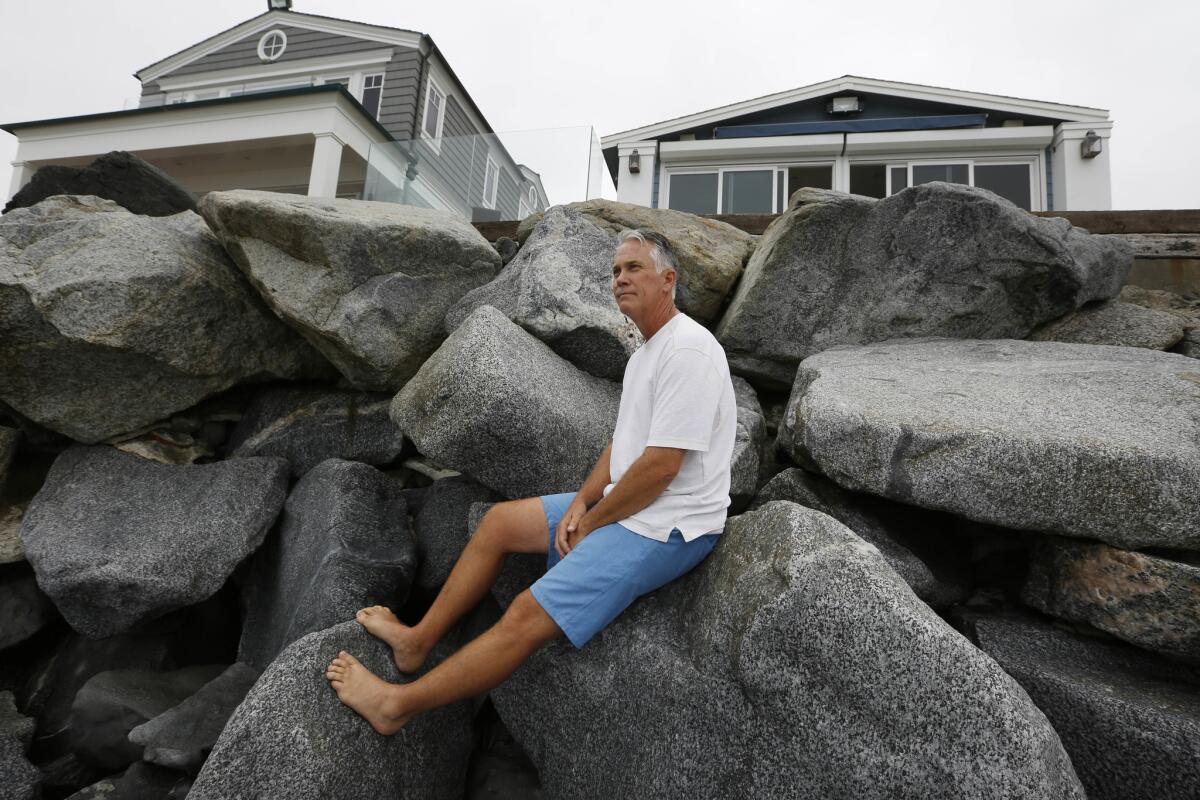Orange County judge rules that Coastal Commission cannot prevent repairs to sea wall at mobile home park

- Share via
An Orange County judge has ruled that the California Coastal Commission cannot prevent the repair and maintenance of a sea wall that protects mobile homes in San Clemente.
If allowed to stand, the decision could affect hundreds of oceanfront property owners and a commission policy that limits the use of sea walls and other shoreline protection that researchers say can increase beach erosion far from where the walls are built, keep people from getting to the ocean and make California’s shoreline uglier.
Superior Court Judge Theodore R. Howard ruled Monday that the Coastal Commission overstepped its authority when it denied the Wills family the right to repair, maintain or replace a sea wall in front of a new mobile home they wanted to install at the Capistrano Shores Mobile Home Park.
The park, with about 90 mobile homes, was built in the early 1960s on a narrow, sandy beach that is under steady assault by waves and tides.
Deputy Atty. Gen. Hayley Peterson, representing the commission, had contended in court that when Wills applied for a permit in 2015, he had assured the commission that he would not need to change the rock revetment to protect his property.
The restrictions the commission imposed with the permit, she argued, held Wills to his assurances.
“The condition is reasonable and necessary to ensure that future shoreline protection applications do not avoid review and will conform to the Coastal Act,” Peterson stated in her court papers.
The judge disagreed.
“It appears to be overreaching to have the property owners give up any rights to possible repair or maintenance” of the rock sea wall that protects their home, Howard wrote in his decision.
Howard also stated that the restrictions “seems unreasonably broad and contrary” to U.S. Supreme Court decisions related to the protection of property rights.
This “is exactly what we wanted,” said Eric Wills, whose family has two mobile homes in the Capistrano Shores park. ‘We felt that the Coastal Commission had definitely overreached its authority.”
Larry Salzman, a Pacific Legal Foundation lawyer and Wills’ attorney, contended that the U.S. Supreme Court and other courts have ruled that government cannot demand that people give up their property rights in exchange for construction permits, except to reduce the public impact of a proposed development.
Salzman said the commission has issued more than 100 development permits in the past four years with restrictive sea wall conditions, including two others in Capistrano Shores.
“The result of this case could protect the rights of coastal property owners,” Salzman said. “We hope this decision will cause the commission to reconsider its policy of imposing these types of conditions” on shoreline protection.
Noaki Schwartz, a commission spokesperson, said agency officials are reviewing the decision and evaluating options.
She added that the lawsuit “illustrates how challenging it can be planning for new development along the coastline in an age of sea-level rise.”
The powerful land-use agency that oversees development, environmental protection, public access and use of marine resources, has established a program to cope with the impacts of sea-level rise along 1,100 miles of California shoreline. A budget increase of $3 million this year will be used primarily for the effort.
Last summer, the commission issued a 300-page document with detailed guidelines for addressing sea-level rise in the issuance of development permits and updating local coastal programs — the planning documents drafted by county and city governments as required by the California Coastal Act.
In his decision, Judge Howard noted that commission officials are concerned that the rock pile protecting the Capistrano Shores park is going to require expansion in the future because of sea-level rise. If the expansion is seaward, he stated, it could reduce the sand available for the public beach.
Anticipating that event, “the commission is essentially trying to have the individual mobile home owners and space lessees give up any rights to shoreline protection when they are updating their mobile homes entirely inside the park,” Howard wrote.
He went on to note, however: “This may be a recurring issue as the mobile homes are replaced.”
UPDATES:
Aug. 26, 1 p.m.: This article was updated with additional details.
This article was originally published at 6:50 p.m. on Aug. 25.
More to Read
Sign up for Essential California
The most important California stories and recommendations in your inbox every morning.
You may occasionally receive promotional content from the Los Angeles Times.











